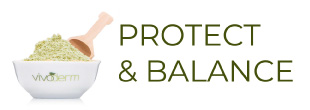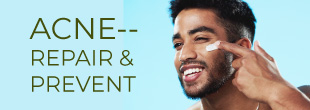Do You Have Sensitive Skin?
- Is your skin easily damaged or irritated?
- Is your skin dry, delicate and prone to irritant or allergic reactions?
- Does your skin have a reduced tolerance to cold, heat, wind, temperature changes, or pollution?
If you answer yes to any or all of these questions, consider yourself a member of the “sensitive skin” club to which 56 per cent of Canadian women claim to belong. Of this group, more than 46 per cent also have dry skin.
What is sensitive skin?
Generally if you have easily irritated or reactive skin, then you have ‘sensitive skin’. Most of the time sensitive skin relates to the face. Sensitive skin can be caused by a genetic predisposition or environmental factors. It appears as a redness, a swelling, itchy and dry irritation to the face. One of the major jobs of the skin is to waterproof. This is done to the epidermis or surface layer of the skin, producing a fat-protein sandwich that is always being replaced and is vital to prevent too much water loss from the skin.
Symptoms of sensitive skin include:
- A tingling or tightening of the skin without visible signs
- “Overreaction” to skin care or cosmetic products
- Reactions to shaving, or other physical stress to the skin
Sensitive skin can also be a heads-up for other conditions, such as:
- Altered skin — due to shaving, waxing, medications or heat, cold, wind, and pollution. Also, laser or chemical peels or scar removal
- Allergic skin – the sudden appearance of redness or swelling and itchiness
- Atopic skin – dry skin that is itchy and produces eczema. Eczema is related to hayfever and asthma. (see Eczema Guide for more information)
- Rosacea skin – blood vessels of the face enlarge resulting in a flushed sensation or a redness of the skin
What to do about your skin?
- Perfume or scented creams can be irritating.
- Rinse well after using cleansing products, which should be mild and soap-free as they do not remove so much oil from the skin (www.MildCleanser.ca gives you more information about this kind of cleansers)
- Use a moisturizer and sunscreen that is formulated for sensitive skin
- Don’t over wash your face. Temperature of the water should be tepid; neither hot or cold
- Don’t use exfoliants
- Be aware of seasonal temperatures. The sudden dryness of winter can mean itchy, dry skin until the skin responds by increasing oil production to reduce the water loss
- For breakouts use a cleanser with salicylic acid to help exfoliate pores. There are also moisturizers that contain salicylic acid
Be sensitive to stress
The causes and effects of stress on the body are not fully known, but for some people stress interferes with the body’s systems that repair and regulate the skin. Stress kills your natural antioxidant defenses, which help to prevent accelerated aging of the skin. Hormones can also trigger a histamine release within the skin causing it to erupt in bumpy redness, or breakout in hives.
Desensitize yourself
When choosing makeup, especially foundation and blush, buy oil-free products. Makeup that is water-based won’t clog pores. Look for oil-absorbing foundations that help keep oil off the face.
As for the rest of your body, check ingredients and avoid harsh chemicals in soaps, shampoos, body cleansers and creams, bath oils, bubble baths, etc.
Put your best face forward
- Watch your alcohol intake, spicy foods and caffeine
- Try to avoid excessive temperature changes
- Use the right cleansers, moisturizers and cosmetics
- Manage stress as best you can
By Richard Thomas, MD, FRCPC




